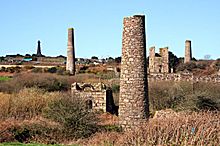West Cornwall Bryophytes Site of Special Scientific Interest facts for kids
| Site of Special Scientific Interest | |

Disused buildings of the West Basset Stamps location
|
|
| Area of Search | Cornwall |
|---|---|
| Coordinates | 50°13′13″N 5°16′47″W / 50.2204°N 5.2796°W |
| Interest | Biological |
| Area | 53.93 hectares (0.539 km2; 0.208 sq mi) |
| Notification | 1999 |
The West Cornwall Bryophytes Site of Special Scientific Interest is a special area in western Cornwall, England. It's made up of seven different spots that used to be places where people mined for metals. These spots are now protected because they are home to very rare and unique plants called bryophytes. Bryophytes are tiny plants like mosses and liverworts. This whole area is also known as an Important Plant Area because of its special plant life.
Contents
What is a Site of Special Scientific Interest?
A Site of Special Scientific Interest, or SSSI for short, is a special place in the United Kingdom that is protected by law. These sites are chosen because they have important wildlife, plants, or interesting geological features. The West Cornwall Bryophytes SSSI is important because of its rare plants.
Where are these special places?
This SSSI is not just one big area. It's actually seven separate locations spread out over about 9 miles (14.5 kilometers) around the towns of Camborne, Redruth, and Helston in Cornwall. Together, these seven spots cover an area of about 53.9 hectares, which is roughly the size of 100 football fields!
The seven locations are:
- Godolphin Bridge
- Dolcoath Road
- Tolgus Tin Works
- Tolgus Tin Works leat (a water channel)
- West Basset Stamps
- Poldice Valley
- Porkellis Moor
All these places used to be busy mining sites. Now, their old buildings and leftover mining waste (called spoil tips) have become perfect homes for the rare bryophytes.
Amazing plants and wildlife
The main reason this area is so special is because of the rare bryophytes that grow there. Bryophytes are small, simple plants like mosses and liverworts. They don't have flowers or seeds. Instead, they reproduce using spores.
The old mining areas, especially the spoil tips that contain copper, provide a unique environment. This environment is just right for these specific rare plants to grow. Because of these special plants, an organization called Plantlife has named the whole site an Important Plant Area.
Rare liverworts and mosses
The West Cornwall Bryophytes SSSI is home to several types of liverworts and mosses that are very rare in Great Britain. Some of the most important ones include:
- Cephaloziella integerrima (a liverwort)
- Cephaloziella massalongi (a liverwort)
- Cephaloziella nicholsonii (a liverwort)
- Scopelophila cataractae (a moss)
Believe it or not, about 20% of all these rare plants found in Britain live right here in these Cornish mining sites! One of the liverworts, Cephaloziella integerrima, has only been found in two other places in the whole British Isles.
Special plants at each location
Each of the seven locations has its own mix of these rare plants:
- At Godolphin Bridge, you can find Pohlia andalusica (a rare moss) and Bryum donianum (another rare moss), along with some of the main liverworts.
- The Dolcoath Road area is home to Cephaloziella integerrima and Cephaloziella nicholsonii.
- Both Tolgus Tin Works sites are special because Pohlia andalusica grows there and produces its capsules (which contain spores) only at these spots in Britain.
- West Basset Stamps has the three main rare liverworts, plus Pohlia andalusica and two rare mosses: Bryum pallescens and Gymnostomum viridulum. The Gymnostomum viridulum moss also produces its capsules only at this site in Britain.
- Poldice Valley is home to Cephaloziella nicholsonii, Pohlia andalusica, and Bryum donianum.
- On the open areas of the spoil tips at Porkellis Moor, you can find the three main rare liverworts and Pohlia andalusica.
These old mining sites are like hidden treasures for these tiny, but very important, plants!
 | Calvin Brent |
 | Walter T. Bailey |
 | Martha Cassell Thompson |
 | Alberta Jeannette Cassell |

